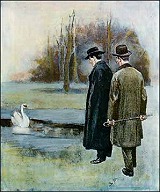“No, no, Lady Brackenstall - it is no use. You may have heard of any little reputation which I possess. I will stake it all on the fact that your story is an absolute fabrication.”
Mistress and maid were both staring at Holmes with pale faces and frightened eyes.
“You are an impudent fellow!” cried Theresa. “Do you mean to say that my mistress has told a lie?”
Holmes rose from his chair.
“Have you nothing to tell me?”
“I have told you everything.”
“Think once more, Lady Brackenstall. Would it not be better to be frank?”
For an instant there was hesitation in her beautiful face. Then some new strong thought caused it to set like a mask.
“I have told you all I know.”
Holmes took his hat and shrugged his shoulders. “I am sorry,” he said, and without another word we left the room and the house. There was a pond in the park, and to this my friend led the way. It was frozen over, but a single hole was left for the convenience of a solitary swan. Holmes gazed at it, and then passed on to the lodge gate. There he scribbled a short note for Stanley Hopkins, and left it with the lodge-keeper.

“It may be a hit, or it may be a miss, but we are bound to do something for friend Hopkins, just to justify this second visit,” said he. “I will not quite take him into my confidence yet. I think our next scene of operations must be the shipping office of the Adelaide-Southampton line, which stands at the end of Pall Mall, if I remember right. There is a second line of steamers which connect South Australia with England, but we will draw the larger cover first.”
Holmes’s card sent in to the manager ensured instant attention, and he was not long in acquiring all the information he needed. In June of ’95, only one of their line had reached a home port. It was the Rock of Gibraltar, their largest and best boat. A reference to the passenger list showed that Miss Fraser, of Adelaide, with her maid had made the voyage in her. The boat was now somewhere south of the Suez Canal on her way to Australia. Her officers were the same as in ’95, with one exception. The first officer, Mr. Jack Crocker, had been made a captain and was to take charge of their new ship, the Bass Rock, sailing in two days’ time from Southampton. He lived at Sydenham, but he was likely to be in that morning for instructions, if we cared to wait for him.
No, Mr. Holmes had no desire to see him, but would be glad to know more about his record and character.
His record was magnificent. There was not an officer in the fleet to touch him. As to his character, he was reliable on duty, but a wild, desperate fellow off the deck of his ship-hot-headed, excitable, but loyal, honest, and kind-hearted. That was the pith of the information with which Holmes left the office of the Adelaide-Southampton company. Thence he drove to Scotland Yard, but, instead of entering, he sat in his cab with his brows drawn down, lost in profound thought. Finally he drove round to the Charing Cross telegraph office, sent off a message, and then, at last, we made for Baker Street once more.
“No, I couldn’t do it, Watson,” said he, as we reentered our room. “Once that warrant was made out, nothing on earth would save him. Once or twice in my career I feel that I have done more real harm by my discovery of the criminal than ever he had done by his crime. I have learned caution now, and I had rather play tricks with the law of England than with my own conscience. Let us know a little more before we act.”
Before evening, we had a visit from Inspector Stanley Hopkins. Things were not going very well with him.